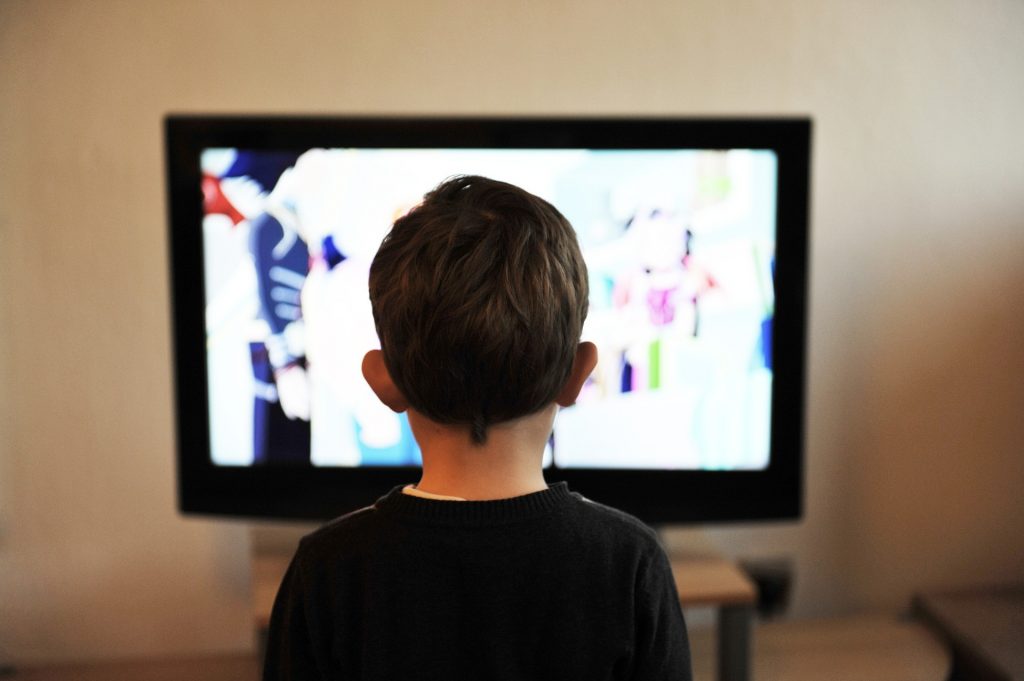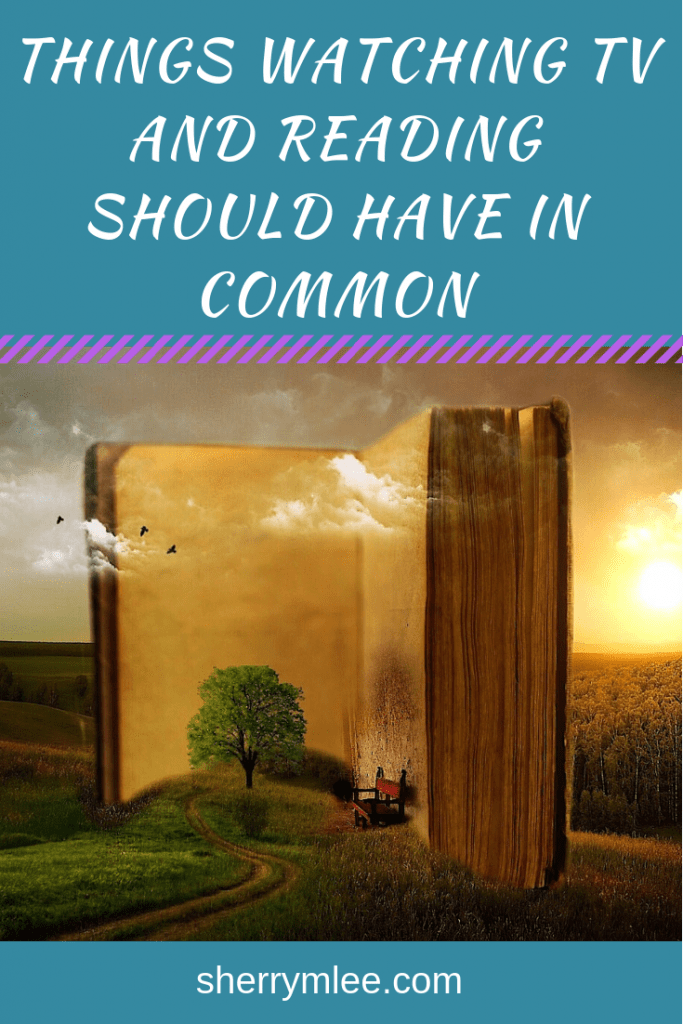Even though watching TV appears to be mindless at times, it really isn’t. There are many skills that we seemingly automatically learn to use that make watching TV an enjoyable pastime. Many of these skills are necessary to also implement into our reading in order for it also to be enjoyable and fully comprehended.
What are these watching TV and reading skills I speak of? They are as follows:

Reliance on Background Knowledge
We rarely, if ever, just watch a new show that we haven’t been exposed to some sort of preview for or that hasn’t been recommended by someone we trust. We then use that information to compare with what we already know about the topic.
This is an important skill to transfer to our reading. Great readers rarely start reading a book without reading the synopsis, knowing the author’s writing style, and/or already being familiar with a character or storyline in some way.
Many individuals will pick up a book simply because it is time to read. The book is quickly put down as it doesn’t hold their interest. Previewing the book properly prior to reading it may help to avoid this. Being able to have some background knowledge to rely on when reading helps with comprehension as well as being able to have empathy for the characters we are reading about.
Making Predictions
Whether we choose to immediately acknowledge it or not, we all make predictions when watching TV. We predict what will happen to certain characters. We predict where characters are going, what they are going to do and how.
When what we predict doesn’t happen, we become pleasantly (or unpleasantly) surprised. Becoming surprised is part of what makes TV watching so enjoyable. If what we predict were to always come true, there would be no point in watching TV. It would be too boring.
Making predictions not only keeps us engaged in the show, but it also prepares our brains for what is to come. The same is true for reading. Making predictions is a necessary strategy to implement when reading. It gives the reader something to compare to that will enhance comprehension. How many times do we tell ourselves when watching TV, “Oh, I didn’t see that coming! I thought this was going to happen, but this happened instead!” This is all part of our brains processing the information we are being presented with.

Making Inferences
Making inferences refers to one’s ability to “read between the lines.” It is being able to take information that is implied and compare it to our own experiences to make an educated guess or informed conclusion. To learn more about this, check out a previous post I wrote called Tips for Helping Readers Make Inferences.
We need to make inferences regularly when watching TV. Clues are given and the viewer must rely on background knowledge, putting clues together, and the ability to read between the lines to fully comprehend what he/she is watching.
Some movie producers are geniuses at making shows appealing to both adults and children. They include references to things that adults would understand, but children wouldn’t yet have the background knowledge to understand. This is done intentionally to keep viewers of all ages engaged.
Books are the same. Even though a youth may have the ability to read the words of a novel written for adults, the comprehension piece will be difficult as they do not yet have the life experience required to make all of the necessary inferences the author intends for the reader to make.
Visualizing
Okay, I fully admit that TV shows make visualization easy for the viewer. There isn’t much visualization within the mind that needs to occur. This visualization helps us to comprehend what is happening.
When reading, it is important to create a picture in our minds of what is happening. For the more visual reader, it will need to happen at the end of nearly every sentence. A period could mean “pause and picture what just happened.” Other readers may only need to create a picture and visualize after every paragraph or page.
This is all something the strong reader tends to do naturally. For others, it will be necessary to teach, provide encouragement, and provide practice opportunities to implement visualization into their reading.

Understanding of Tone and Mood
Tone refers to how the producer or writer portrays the setting and the atmosphere. Mood has to do with how we then feel as the viewer or reader.
Think of how often music, scene, and lighting changes are used in television shows. In many cases, the viewer will hardly notice them but will start to feel happy, sad, scared, or otherwise when there is a change in the tone. The tone set plays an important role in keeping the viewer engaged with what he/she is watching.
Authors implement tone and mood when telling stories. Learning to pay attention to adjectives and adverbs used within the story is important. Being attentive to the setting, the characters and their words and actions are also necessary to have full comprehension of what we are reading.
To learn more about tone and mood, I welcome you to check out a previous post I wrote called Introducing Tone and Mood to Young Readers.
Rewind When Needed
We all have experienced missing an important part of a TV show. With today’s technology, this really isn’t a problem. We simply rewind the part that we missed and move on.
Equivalent to this, we have all drifted off while reading. Just like we don’t hesitate to rewind back to the important part of the TV show that we missed, we may need to rewind back to the last part of the book we remember reading with comprehension. This way, we won’t miss any of those important details that are necessary for fully comprehending the story that we are reading.

Did I Miss Any?
Are there any other skills you use when watching TV that are necessary to also implement when reading? Please let me know any important skills used for both watching TV and reading in the comments below. 🙂
Looking for support in helping your child with reading? Be sure to check out Y Literacy!

31 Comments
What a fun post! Great ideas to make watching TV more interactive.
Thank you, Catherine! 🙂
I have never really thought of this, I think you make a great point and from now on won’t feel bad about watching television.
Thank you for sharing,
Liliana
Thank you for taking the time to read this post, Liliana. I appreciate it! 🙂
I had not thought of commercials or previews as being a way to understand things better. When I was teaching a Shakespeare class, I learned that before watching any play, I had to read the summary or I would be lost. Do you talk your children through these as you watch TV with them?
I find my kids frequently talk to each other about commercials and previews that capture their interest when tuned into channels that are geared to their age level and that they would already have background knowledge for. Therefore they are doing this more ‘automatically’ so to speak. I do talk through these a bit more with them during commercials and previews for shows I am more interested in, which they don’t necessarily have all of the required background knowledge for. I bet reading the summary to Shakespeare plays prior to watching them would be a helpful strategy for anyone. Thank you for providing that great example! 🙂
I often watch tv to study story structure. Some shows offer great examples; others not so much! 🙂
I bet studying story structure from watching stories on TV is a helpful strategy used by a lot of authors such as yourself. Thank you so much for sharing! 🙂
Perspective-Shifting, cultivating Multiple-Perspectives, Abstracting, inferring, deducing, extracting Implication, perception of out-of-frame context, Symbolic Interpretation, personalising according to intimate Pertinence and Relevance, looking beyond the obvious, Appreciating of extra, connecting to greater societal movements (of culture, ethics, morality, popularity etc,) and More. We can watch and we can also LOOK at TV, or anything, look past what is obviously presented, and what is revealed by implication and inference, and so much besides. What we get is a function of US, not what’s presented. 🙂 😀
Wow! I hadn’t thought of all of these, but I am in complete agreement with you. There is so much to be learned that can be transferred to reading as long as we look past what is obviously presented. Thank you so much for adding to this post! 🙂
This is brilliant! I don’t have to feel guilty anymore for the extra tv time , that’s also helping in someways I didn’t know of before!
This is quite an interesting perspective. I love the common traits. Never thought about watching t.v and reading a book could be so similar. Thank you for sharing this! It was fun to read.
Thank you, Angel! 🙂
This is such an interesting post. I have never thought about this before but it’s all true! Thanks!!
Thank you for taking the time to check it out! 🙂
As a former elementary teacher, I enjoyed this post. I think choosing the right show for our kiddos, along with choosing the right books, help to stimulate their interests and motivations for learning more about a certain subject. I am always impressed with how many facts kids can retain when it’s about something that intrigues them.
Thank you, Sonja! I definitely agree with you. 🙂
I loved reading this post! Definitely interesting how watching TV compares to reading. My kids do watch TV and I have always thought there is value in it. They learn a great deal from these ideas you share and many of the shows they watch are quite educational!
Thank you, Lauren! There can be valuable learning taking place when strategies are used. These strategies tend to come more naturally while watching TV and often have to be specifically taught for reading. 🙂
This is a new perspective on TV and reading that makes me agree on many ways. Both are truly interactive and educational in their own ways. Great insights here!
Thank you, Nessly! 🙂
This is great!! It can be a great tool to teach some of these same skills for children who may not enjoy reading or have trouble with reading. I’m such a book worm though so I hope my boys are as well!!
I hope so, too! 😀
What a fantastic post! All so true! I try very hard to keep a conversation going with my son when we watch tv together. 🙂
That’s awesome, Leslie! Keep up the great work. Your son will remember these special times. 😀
I love this post! I never thought about it from this perspective, Thank you for sharing.
You’re very welcome, Ann! 😀
Very true and something to think about.
🙂